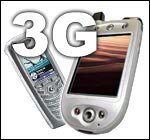|
|
| |
Home > Research > Telecommunications > ResearchItem
|
3G Mobile Policy: The Case Of Ghana
 Third Generation is the generic term used for the next generation of mobile communications systems. 3G Third Generation is the generic term used for the next generation of mobile communications systems. 3G
systems will provide enhanced services to those - such as voice, text and data - predominantly available
today. The technology concepts for 3rd Generation systems and services are currently under development
industry-wide. 3G is based on today's GSM1 standard, but evolved, extended and enhanced to include an
additional radio air interface, better suited for high speed and multimedia data services. GSM is an
established global standard for mobile communications. As a technology, GSM continues to evolve, with
high-bandwidth services becoming a reality for the current 2nd Generation technologies. The GSM network
will evolve, with wireless, satellite and cordless systems offering greatly expanded services, including high
speed, multi-media data services, in-built support for parallel usage of such services and seamless connection
with the Internet and wireline networks. This will see the true convergence between various communications
means and networks becoming a reality. With 3G, communications have moved from the traditional voice
kiosk to a data hypermarket thus making the Internet accessible through mobile devices. The result will be a
mobile Internet that allows point-of-sale transactions and location-based services in a way that differs
completely from today's Internet. 3G will bring a host of mobile services, which will bring more information
and more efficiency.
----------------------------------- Chris Addy-Nayo, Consultant, WorldSpace. -2004
Read Full Text
|
|
|
|
|
|
|
|

Receive our newsletter and updates of GCG activities
|
| |
|
|
|